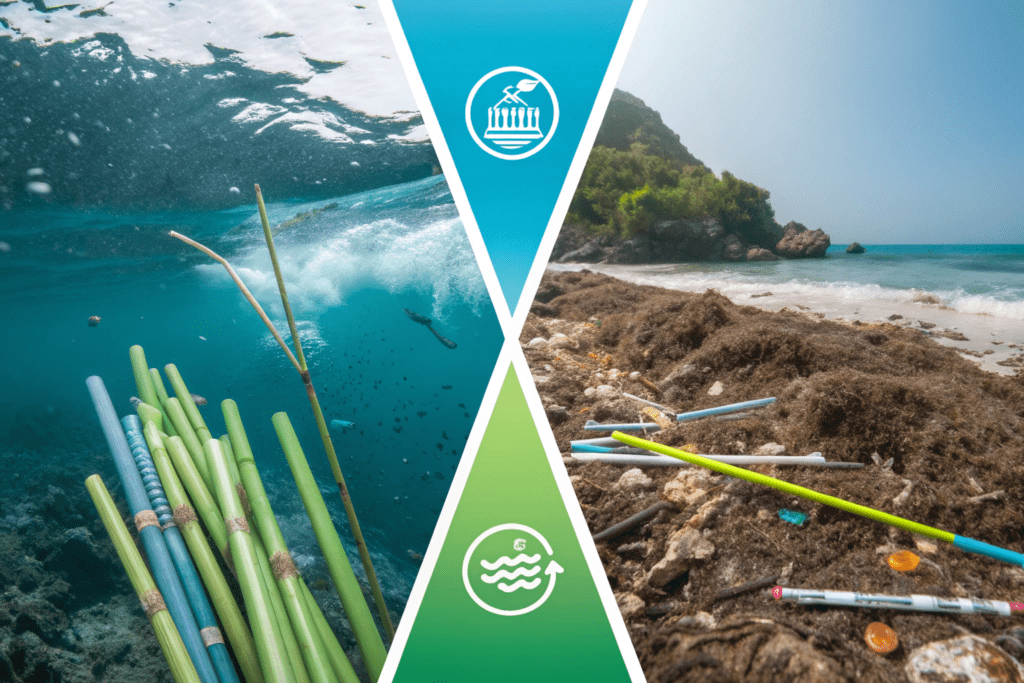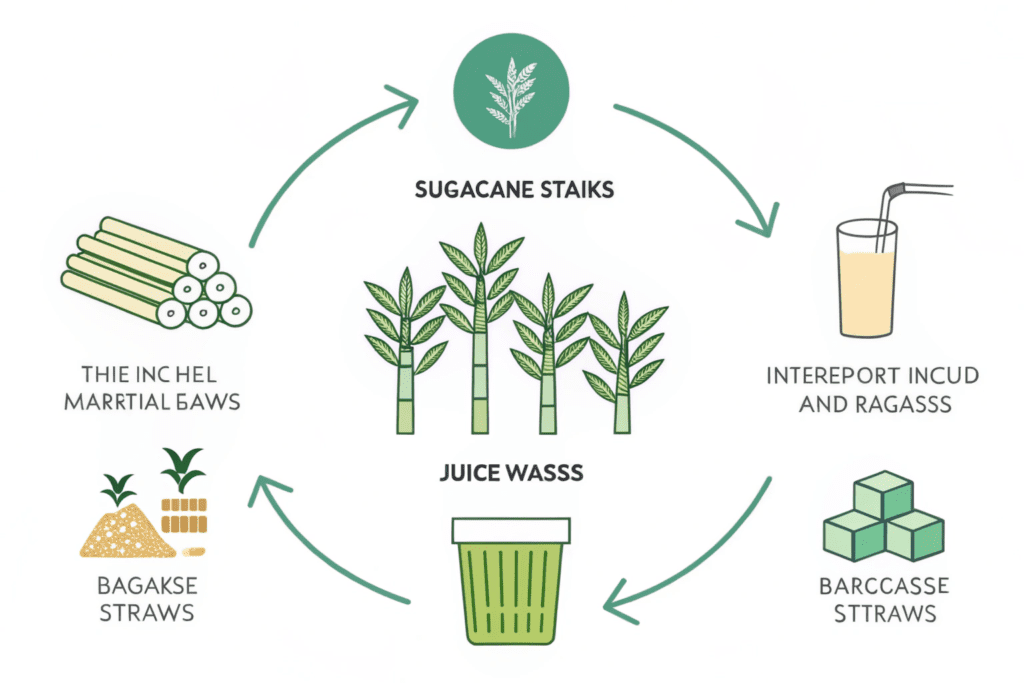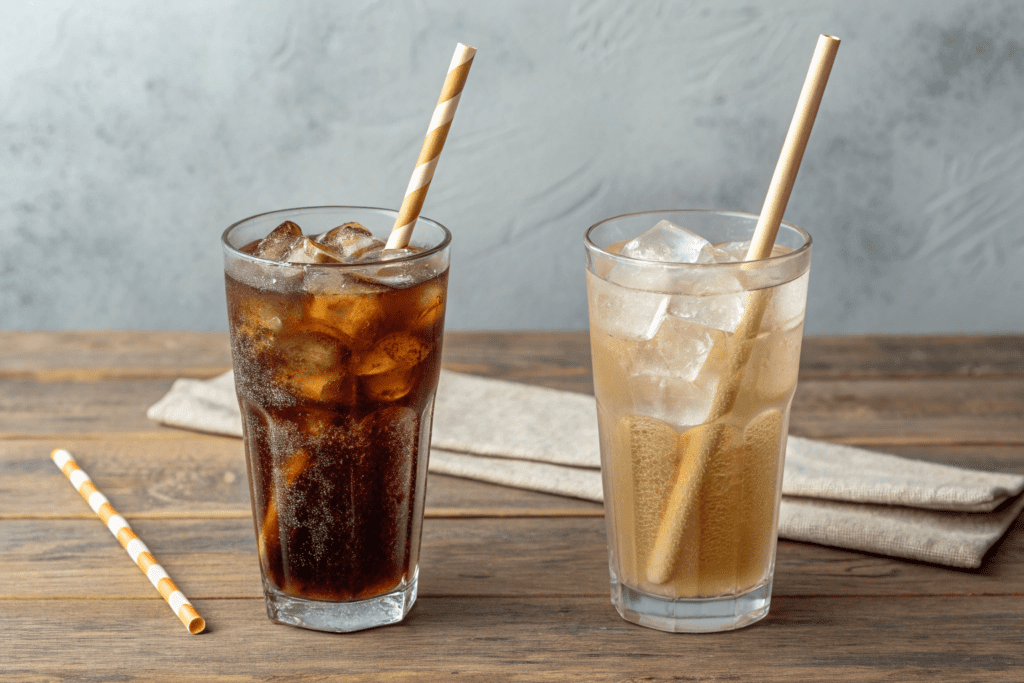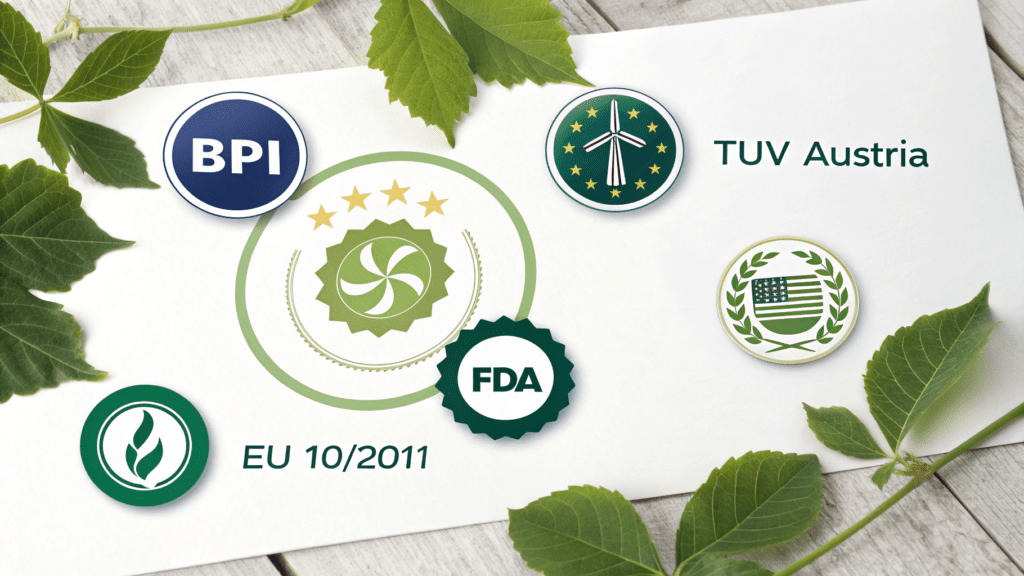
The global foodservice industry is at a critical juncture, facing immense pressure to significantly reduce its environmental footprint. At the heart of this challenge lies single-use plastic waste, with traditional plastic straws contributing billions of discarded units annually to landfills and oceans. These ubiquitous items persist for centuries, inflicting severe harm on marine wildlife and delicate ecosystems. The operational and commercial impacts of ignoring this environmental crisis are profound, ranging from crippling regulatory fines to irreparable damage to brand reputation.
However, a powerful and compliant alternative is emerging: sugarcane straws. Derived from agricultural waste, these innovative products offer a compelling solution that aligns perfectly with the evolving demands of both consumers and regulators. Discover how embracing this sustainable choice can future-proof your business operations, enhance your brand value, and secure your place as a leader in environmentally responsible foodservice.
Sugarcane straws offer a sustainable, compliant, and economically viable future for foodservice.
The Urgent Need for Sustainable Foodservice: Beyond Plastic Pollution
The sheer volume of plastic waste generated by the foodservice sector represents a global environmental crisis. Globally, billions of plastic straws are discarded each year, funneling into vast pollution streams that contaminate our planet. Once in the environment, these plastic pollutants persist for hundreds of years, fragmenting into microplastics that infiltrate food chains and damage marine ecosystems. Peer-reviewed studies, such as research published in theJournal of Industrial Ecologyin 2023, underscore the urgency, confirming that sugarcane-based products demonstrate a significant 50-70% lower overall environmental impact compared to their plastic counterparts.
This environmental imperative is compounded by a rapidly evolving regulatory landscape. Over 130 countries worldwide have enacted plastic bans or restrictions, culminating in landmark legislation like the European Union Single-Use Plastics Directive (EU SUPD), which came into full effect on July 3, 2021. This directive specifically targets items such as plastic straws. Non-compliance with these stringent regulations can lead to severe fines, operational disruptions, and profound reputational damage that erodes consumer trust and market access. For instance, while some regions, like Western Australia, have nuanced bans that may include certain bioplastics, sugarcane straws, specifically those free of problematic plastic additives, offer a compliant solution, aligning with global environmental mandates and enabling businesses to navigate complex legal frameworks proactively.
Procurement managers, operations directors, and supply chain executives must recognize that inaction is no longer a viable strategy. The public, increasingly aware of plastic pollution’s pervasive effects, expects businesses to lead by example. A 2022 survey revealed that approximately 80% of consumers actively prioritize and seek out eco-friendly options, directly linking sustainable practices to purchasing decisions and customer loyalty. Failing to adapt to this shift risks alienating a critical segment of your customer base and compromising long-term business viability.
Global plastic bans and consumer demand necessitate urgent foodservice sustainability action.
What Makes Sugarcane Straws the Superior Choice for Foodservice?
From Agricultural Waste to Eco-Friendly Straws: The Bagasse Advantage
The core innovation behind sugarcane straws lies in their material source: bagasse. This fibrous residue is a natural byproduct of sugarcane processing, left after the juice has been extracted for sugar or ethanol production. Instead of being discarded or burned as agricultural waste, every ton of sugarcane processed yields approximately 250 kilograms of bagasse, which can then be repurposed to produce around 200 kilograms of eco-friendly straws. This utilization of an existing waste stream embodies the principles of a circular economy, significantly reducing the demand for virgin resources and minimizing environmental impact from the outset.
Sugarcane straws are 100% plant-based and entirely free from conventional plastics or harmful chemicals. Their true environmental advantage lies in their end-of-life profile: they are fully biodegradable and compostable, breaking down within 60 to 180 days in industrial composting facilities. Many varieties are also certified home compostable, decomposing naturally without leaving behind microplastics or toxic residues, ensuring a responsible return to the earth.

Sugarcane straws, made from bagasse, are 100% plant-based, biodegradable, and compostable.
Unmatched Durability and Performance in Foodservice
A common pitfall of early eco-friendly straw alternatives, particularly many paper straws, was their tendency to become soggy and disintegrate quickly. Sugarcane straws overcome this significant operational hurdle with their inherent robustness. They are remarkably resistant to sogginess, maintaining their integrity in both hot (withstanding temperatures up to 100°C or 212°F) and cold beverages for extended periods, often for hours or even a full day. This ensures a consistent and enjoyable customer experience, minimizing complaints and the need for replacements.
Beyond their structural resilience, sugarcane straws are taste-neutral. This crucial feature ensures that the flavor of the beverage remains unaltered, a common complaint with certain other plant-based or starch-based alternatives. Their comparable robustness to plastic, coupled with their natural feel, makes them a seamless and preferred transition for both foodservice staff and consumers. For a deeper dive into the benefits of sugarcane bagasse in sustainable procurement, explore our guide onSugarcane Bagasse Straws B2B Sustainable Procurement。
Sugarcane straws offer superior durability and taste-neutral performance for foodservice.
Health & Safety Assurance: PFAS-Free & Food-Grade
In an era of heightened consumer awareness regarding chemical exposure, the safety profile of foodservice disposables is paramount. Sugarcane straws offer a reassuring solution. They are naturally free from harmful chemicals such as BPA, and critically, are PFAS-free. Per- and polyfluoroalkyl substances (PFAS), often referred to as “forever chemicals,” are synthetic compounds commonly found in conventional food packaging and can pose long-term health risks. Sugarcane straws also avoid harmful dyes and petroleum-based additives.
Many reputable sugarcane straw products are US FDA Approved and comply with stringent European Union regulations like EU 10/2011, which sets comprehensive safety requirements for food contact materials. Furthermore, certifications from leading independent bodies such as BPI Industrial (confirming adherence to ASTM D6400 and ASTM D6868 standards for industrial compostability) and TÜV Austria (offering OK Compost Home and OK Compost Industrial certifications) provide verifiable assurance of their safety, compostability, and environmental integrity. BSI Carbon Footprint Certification (ISO 14067) further indicates low carbon footprint production, offering peace of mind to sustainability officers.
Sugarcane straws are PFAS-free, FDA Approved, and certified safe for food contact.
The Business Imperative: ROI and Brand Enhancement with Sugarcane Straws
Economic Viability: Mitigating Fines and Maximizing ROI
The financial implications of non-compliance with global plastic bans can be severe. By transitioning to compliant alternatives like sugarcane straws, businesses can entirely avoid costly fines and legal repercussions associated with single-use plastic regulations. While the unit cost of sugarcane straws might initially be slightly higher than traditional plastic options, strategic bulk purchasing and optimized supply chain management can significantly mitigate these upfront expenses.
The long-term economic viability extends beyond avoided penalties. Enhanced brand image directly translates into increased customer loyalty and a broader market appeal, particularly among the growing demographic of eco-conscious consumers. Businesses that proactively embrace sustainability often report boosted sales and a stronger market position. Some businesses have even reported a 10-15% overall cost reduction over time, when factoring in avoided fines and the positive impact on customer acquisition and retention. Moreover, the long-term trend suggests that as production scales and technology advances, the price gap between sustainable and traditional disposables will continue to narrow.
Projected ROI for Foodservice Businesses Adopting Sugarcane Straws (Illustrative)
| Metric | Traditional Plastic Straws (Baseline) | Sugarcane Straws (Projected) | Impact |
|---|---|---|---|
| Annual Plastic Straw Cost (Units) | $10,000 (1M units @ $0.01) | $12,000 (1M units @ $0.012) | +20% initial unit cost |
| Potential Fines (Non-compliance) | Up to $50,000+ | $0 | Avoided risk |
| Customer Acquisition Cost (CAC) | High (due to negative perception) | Reduced (attracts eco-conscious consumers) | Improved brand appeal |
| Customer Retention Rate | Standard | Increased (loyalty from sustainable practices) | Enhanced loyalty |
| Operational Efficiency (Soggy Straws) | Low (customer complaints, replacements) | High (durable, fewer complaints) | Smoother operations |
| Overall Long-Term Cost Reduction | N/A | 10-15% (factoring fines, acquisition, retention) | Significant savings |
Sugarcane straws mitigate fines and offer long-term ROI through brand and efficiency gains.
Elevating Brand Image: Meeting Consumer Demand for Eco-Friendly Straws
Consumer demand for eco-friendly products is not a niche market; it is a dominant trend. A substantial 80% of consumers now prioritize and actively seek out businesses that demonstrate a commitment to environmental responsibility. By adopting sugarcane straws, foodservice establishments can signal their dedication to sustainability, directly appealing to this large and influential customer segment.
This proactive approach to sustainability significantly enhances brand reputation, distinguishing businesses in a competitive market. Prestigious eco magazines and industry publications frequently commend businesses that adopt such forward-thinking alternatives, generating positive public relations and reinforcing a strong, responsible brand identity. This alignment with consumer values fosters deeper customer relationships and can lead to increased market share. For insights into broadening your sustainable procurement across hospitality, consider ourBamboo and Sugarcane Sustainable Hospitality Procurement Guide。

Adopting sugarcane straws significantly boosts brand image and attracts eco-conscious consumers.
Case Study: Real-World Success in Foodservice Sustainability
Real-world examples powerfully demonstrate the tangible benefits of transitioning to sugarcane straws:
- GreenEats Restaurant: A mid-sized restaurant chain, GreenEats, implemented sugarcane straws across all its locations. Within the first year, they reported a remarkable 20% increase in their environmentally conscious customer base. This growth was directly attributed to their public commitment to sustainability, highlighted by the switch to eco-friendly disposables, showcasing how consumer values can drive business success.
- Strwd (Australia): Faced with Australia’s evolving plastic regulations and strong consumer sentiment, Strwd, a leading foodservice supplier, took a bold step. In its first year of operation, Strwd successfully replaced over 500,000 traditional paper straws with sugarcane alternatives across 60 client sites. This aggressive adoption not only ensured compliance but also positioned their clients as sustainability leaders, demonstrating a practical and scalable solution to plastic waste.
These case studies illustrate that embracing sustainable choices like sugarcane straws is not merely a cost center but a strategic investment that yields tangible results, from increased customer engagement to significant waste reduction.
Real-world cases prove sugarcane straws drive customer growth and waste reduction.
Navigating the Market: Certifications and Future Growth of Sugarcane Straws
Verifying Sustainability: Key Certifications for Compostable Straws
To ensure genuine sustainability and compliance, decision-makers must look for reputable third-party certifications. These certifications verify a product’s biodegradability, compostability, and safety standards:
- BPI Industrial: The Biodegradable Products Institute (BPI) is North America’s leading certifier for compostable products and packaging. BPI certification ensures that products like sugarcane straws will safely and effectively compost in industrial facilities, adhering to rigorous standards such as ASTM D6400 and ASTM D6868.
- TÜV Austria (OK Compost Home/Industrial): This globally recognized certification body offers “OK Compost Industrial” for products designed to compost in industrial facilities and “OK Compost Home” for materials that can break down safely in backyard compost systems, providing flexibility and broad environmental benefit.
- EU 10/2011 and US FDA Approved: These signify compliance with critical food safety regulations, ensuring that the materials are safe for food contact and do not leach harmful substances into beverages.
- BSI Carbon Footprint Certification (ISO 14067): This certification indicates that the product’s manufacturing process has a quantified low carbon footprint, aligning with broader corporate sustainability goals.
- Australasian Bioplastics Association (ABA) Certifications (AS5810 for home compostable and AS4736 for industrially compostable): These provide national assurances of compostability, particularly relevant for operations in Australia.
Selecting products with these certifications mitigates compliance risks and reinforces a genuine commitment to environmental responsibility. For further details on the inherent sustainability and accessibility features of sugarcane straws, see our comprehensive guide onSugarcane Straws: Sustainability and Accessibility。
Certifications like BPI and TÜV Austria ensure sugarcane straw sustainability and compliance.

Market Projections: A Growth Trajectory for Eco-Friendly Straws
The market for eco-friendly straws, driven by escalating environmental concerns and global regulatory pushes, is experiencing robust growth. The global eco-friendly straw market was valued at an impressive USD 1.8 billion in 2023 and is projected to surge toUSD 5.1 billion by 2030, reflecting a substantial compound annual growth rate (CAGR) of 16.2% from 2024 to 2030.
Within this expansive market, sugarcane straws are carving out a significant and growing niche. The global sugarcane straws market itself was valued at USD 10.7 million in 2023 and is projected to reachUSD 16.9 million by 2030, demonstrating a steady CAGR of 6.7% over the forecast period. Geographically, the Asia Pacific region commanded the largest revenue share, exceeding 35% in 2023, while North America is anticipated to exhibit remarkable growth with a projected 15.8% CAGR. These projections indicate a stable and expanding market, ensuring long-term supply chain reliability and increasingly competitive pricing as demand scales.
Looking ahead 5–10 years, innovation in sugarcane straw technology is expected to further enhance their appeal. Research is ongoing into “second-generation” sugarcane straws that offer even higher temperature resistance and can integrate other agricultural waste streams, such as coffee grounds and bamboo fiber, creating multi-fiber solutions and bolstering the circular economy. This continuous improvement ensures that sugarcane straws will remain at the forefront of sustainable foodservice solutions. The valorization of sugarcane straw as a valuable feedstock for biocomposites is also a burgeoning area of academic research, promising even more diverse applications and further solidifying its role in sustainable material science.

The eco-friendly straw market, including sugarcane, shows robust growth projections.
Competitive Advantage & Business Case
For procurement managers and supply chain executives, the decision to adopt sugarcane straws translates directly into a compelling competitive advantage and a robust business case.
Quantifiable Benefits:
- Cost Savings & Risk Mitigation: By proactively transitioning to compliant sugarcane straws, businesses directly mitigate the financial risk of non-compliance fines from escalating global plastic bans. This strategic move safeguards budgets and ensures uninterrupted market access. While the initial unit cost might be marginally higher than traditional plastic, bulk purchasing strategies combined with avoided penalties can lead to an overall cost reduction in the long run.
- Brand Value Uplift & Market Share Opportunity: The alignment with consumer values is undeniable. With 80% of consumers prioritizing eco-friendly options, a commitment to sustainable disposables directly enhances brand equity. This isn’t just about good public relations; it’s about attracting and retaining a growing segment of environmentally conscious customers. Businesses positioned as sustainability leaders can capture significant market share from less adaptable competitors. The foodservice segment of the broader sugarcane packaging market alone, valued at USD 157.4 million in 2024, is poised for continued growth, offering a clear opportunity for market leadership.
- Operational Efficiency: The superior durability and performance of sugarcane straws, eliminating the “soggy straw” complaints common with paper alternatives, translate into a smoother operational flow. Fewer customer complaints mean less staff time spent on service recovery, contributing to overall operational efficiency and an improved customer experience.
By embracing sugarcane straws, your organization isn’t just reacting to regulatory pressures; it’s proactively building a resilient, ethical, and economically advantageous business model. This positions your brand as a responsible industry leader, fostering deeper customer loyalty and opening new avenues for growth in an increasingly sustainability-driven market. The global sugarcane packaging opportunity, estimated at around USD 5.7 billion, projected to achieve 1.8X growth, signals a profound shift that forward-thinking businesses must capitalize on.
Sugarcane straws offer competitive advantages through cost savings, brand uplift, and efficiency.
よくある質問(FAQ)
Why are sugarcane straws better than paper straws for foodservice?
Sugarcane straws are significantly more durable, resisting sogginess in both hot and cold beverages for hours, unlike many paper alternatives. They also maintain a neutral taste, ensuring a superior customer experience.
Are sugarcane straws truly biodegradable and compostable?
Yes, sugarcane straws are 100% plant-based, fully biodegradable, and compostable. They break down within 60-180 days in industrial composting facilities and many are certified home compostable, leaving no microplastics.
How do sugarcane straws help with regulatory compliance in foodservice?
By transitioning to sugarcane straws, foodservice businesses can avoid costly fines and legal repercussions associated with global single-use plastic bans, such as the EU SUPD, ensuring proactive compliance.
What certifications should I look for when sourcing sugarcane straws?
Look for certifications like BPI Industrial, TÜV Austria (OK Compost Home/Industrial), US FDA Approval, EU 10/2011, BSI Carbon Footprint Certification (ISO 14067), and Australasian Bioplastics Association (ABA) certifications (AS5810, AS4736).
Can switching to sugarcane straws improve my restaurant’s brand image?
Absolutely. With 80% of consumers prioritizing eco-friendly options, adopting sugarcane straws signals your commitment to sustainability, enhancing brand reputation, attracting eco-conscious customers, and boosting loyalty.
Sugarcane straws offer clear benefits for foodservice sustainability and operations.
結論
Sugarcane straws are far more than a passing eco-friendly trend; they represent a fundamental and strategic imperative for the future of the foodservice industry. Their environmental superiority, born from repurposed agricultural waste and validated by rapid biodegradability, directly addresses the pressing global plastic crisis. Beyond their ecological benefits, their robust performance and significant business advantages—from ensuring regulatory compliance and mitigating financial risks to profoundly enhancing brand reputation and capturing market share—make them the undeniable choice for forward-thinking procurement managers, operations directors, and sustainability officers. Embrace this sustainable innovation not just as a compliance measure, but as a powerful driver of competitive advantage and long-term prosperity.
Sugarcane straws are a strategic imperative for sustainable, profitable foodservice operations.
Take Action
Secure your competitive edge and future-proof your foodservice operations. Request a compliant, high-performance sugarcane straw sample pack today to lead the shift towards a truly sustainable future.Request Your Sample Pack






